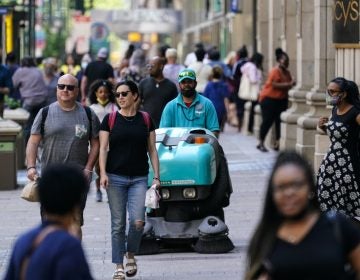Banning the box: Who’s the offender now?
Listen
Because he did time for obtaining prescription painkillers illegally, Michael Urbank says he can't even get a job interview. (Emma Lee/WHYY)
It’s been against the law for more than two years, but some companies doing business in Philly are still asking applicants whether they’ve been convicted of a crime.
A few years ago, Rev. Michelle Simmons had a problem.
As head of Why Not Prosper, a Philadelphia-based nonprofit that helps women who recently got out of prison, she found that the ex-offenders she saw were determined to turn their lives around.
Until, that is, they started looking for a job, and were turned down by employer after employer.
It’s at that point that many women would return to a life of crime, Simmons said.
“I don’t know anybody that come home from jail and say, ‘I’m gonna go home and rob somebody.’ … Most people say, ‘I wanna come home, I’m gonna get me a job,” she said. “After they go out and they look, and they get rejected, then they go back to, ‘Well, maybe I will be better going through somebody’s window.'”
In hopes of improving her clients’ employment prospects, Simmons joined the push for a City Council bill that would prohibit many employers from asking questions about a person’s criminal background on job applications.
On March 31, 2011, lawmakers passed the “ban-the-box” bill, which is so named because many employers ask applicants to check a box if they have a criminal record.
“I really believed if the question came off, that we would get a fair shot at employment,” said Simmons.
Evading the letter of the law
More than two years later, Simmons and other advocates for ex-offenders are questioning the legislation’s results.
Several chain stores have violated the ban-the-box law. Other companies are finding ways around the requirement that are legally dubious.
“What actually has happened now that the bill has passed,” said Simmons, “is not a lot.”
WHYY/NewsWorks.org requested paper applications and accessed online forms to check if companies were complying with the law, which applies to most businesses that have at least 10 employees in Philadelphia.
In the last month and a half, we found that Rite Aid, Forever 21, GNC, Planet Fitness, Sneaker Villa, Modell’s Sporting Goods, Buffalo Exchange, Ashley Stewart and Le Pain Quotidien were still asking if applicants had convictions.
Some of those businesses appear to be trying to skirt the law by adding a note to their online applications stating that Philadelphia job seekers do not need to answer their questions about criminal records, which are ostensibly meant for applicants outside of the city. But the Philadelphia Commission on Human Relations, which enforces the law, said that type of application is illegal.
A senior vice president at Modell’s Sporting Goods said the company would fix the problem right away, as did a spokeswoman for Le Pain Quotidien. A spokeswoman for Rite Aid said that the company is following the law, but did not provide specifics. A Planet Fitness spokeswoman said the company is reviewing the ban-the-box law to ensure it is in compliance.
The other five companies did not provide comment.
Obstacles to redemption
Michael Urbank is all too familiar with the criminal record question. The 28-year-old North Philly resident has been looking for a job since he was released from prison this April. He served two years for obtaining prescription painkillers illegally.
To Urbank, employers see his conviction and nothing else. He said they don’t consider that has been sober for three years, or that he formerly worked as an accounts manager at a Fortune 1,000 company.
“I’ve never gotten my foot in the front door,” he said, “and all I feel like I need is that one company to say, ‘You know what? We’re going to give you a probationary chance.”
Urbank is not alone: White men with a criminal record are 50 percent less likely than non-offenders to get a call back after applying for a job, according to a Northwestern University study. For black men with a criminal history, the figure is 64 percent. City officials estimate that 300,000 Philadelphia residents, one-fifth of the population, have some form of criminal record.
WHYY/NewsWorks.org found that other companies, such as Comcast, Home Depot and PNC Bank, aren’t directly asking about convictions, but they are questioning if job seekers would be willing to submit to a criminal background check.
Those businesses defend their applications as fully compliant.
“It is only fair to inform applicants that a criminal background check may be necessary,” said Fred Solomon, a senior vice president for PNC Bank.
But Rue Landau, executive director of the Philadelphia Commission on Human Relations, said such applications are legally questionable.
“Questions on their application that might dissuade people with records from even applying puts up a couple red flags,” she said. “So we would take a very serious look at those cases.”
Since the law went into effect, the Commission on Human Relations has received 25 complaints alleging breaches.
But Brendan Lynch, an employment lawyer at Community Legal Services, estimates that hundreds of employers are likely breaking the ban-the-box law. He has filed some complaints himself.
“I’ve simply heard too many reports, and seen too many online application forms that still ask the question,” he said.
Undernourished enforcement
Lynch argues that Mayor Michael Nutter should appoint a committee to oversee the law, as City Council recommended in 2011. He also said that the Commission on Human Relations needs more resources to aggressively enforce the law.
“They don’t remotely have the capacity to go throughout the city, and hunt down violators and bring them to justice,” he said.
Landau defends her work, pointing out that most companies found to be in violation by the commission have quickly righted their applications. But she acknowledges that with more resources, the commission could be more “proactive.”
Nutter’s spokesman, Mark McDonald, said he hopes to provide more funding soon. As for an oversight committee, he has not ruled it out, but said that he is pleased with the commission’s track record so far.
Urbank is counting on enforcement of the law to make a difference. He has seen how hard it is for other ex-cons to stay straight when they can’t find work.
“You go back to what you know,” he said. “You know how easy it would be for me to go back to a doctor?”
But Urbank said he doesn’t want to become another statistic.
“I would love nothing more than an opportunity to work at a company,” he said, “and have my life back.”
WHYY is your source for fact-based, in-depth journalism and information. As a nonprofit organization, we rely on financial support from readers like you. Please give today.




